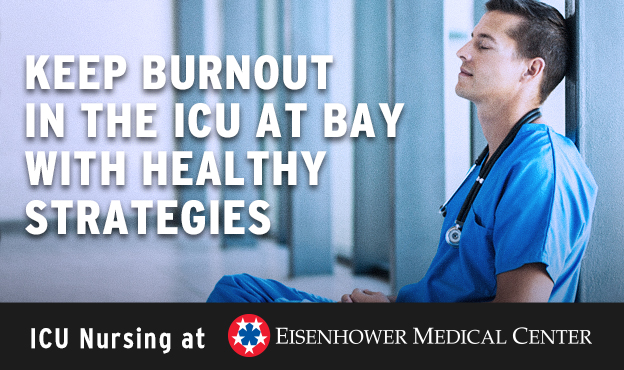
ICU nursing isn’t all that tough of a job — said no critical care nurse EVER.
The fact is ICU nurses face some of the toughest challenges in the nursing profession. The high morbidity and mortality of their patients place intense demands on their work routines. Add in the distress, sorrow, and ethical issues that often occur in critical care settings, and there’s little wonder why ICU nurses consider stress an unavoidable element of their jobs.
Fortunately, the ICU tends to draw independent-minded nurses. High levels of self-sufficiency among successful critical care nurses can fortify them against the physical and emotional ravages of excess stress. ICU nurses also rely heavily on routine. Following regular schedules ensures all-important basics are met (timely checks of vitals, for example), removes guesswork, and opens time to reason through problems and exercise other valuable critical-thinking skills.
ICU nurses balance the stress of their jobs with the immense gratification they gain from participating in safe, positive patient outcomes. Few things are as rewarding to critical care nurses as the successful discharge of patients to step-down or other units.
Still, stress remains a battle to be fought every day in the ICU. If you’re considering an exciting career in a critical care job, it’s beneficial to understand upfront the prevalence of stress in ICU environments and the steps you can take to conquer it.
ICU Nurses at Risk
While nurses generally experience some degree of stress at work, researchers recently found that high-stress ICU environments impact critical care nurses to a greater extent than RNs in other specialties. A report published in July 2016 by the Critical Care Societies Collaborative (CCSC), a group of four professional and scientific societies in the U.S., including the American Association of Critical-Care Nurses (AACN), revealed work-related stress can lead to high incidence of burnout syndrome (BOS) among ICU nurses.
In its review of multiple studies, the CCSC discovered roughly one-quarter to one-third of ICU nurses show symptoms of severe BOS; up to 86% of critical care nurses, the organization says, demonstrate at least one of three signs of BOS.
The most common symptom of BOS, emotional exhaustion, is experienced by 73% of critical care nurses, while 60% of nurses in the ICU feel a lack of personal accomplishment. Forty-eight percent of ICU nurses show signs of depersonalization, the report says.
Organizational factors contribute to the prevalence of BOS among critical care nurses. Three stressors in particular appear to spur the development of burnout symptoms, according to the CCSC: increased workload, feeling a lack of control over the work setting, and a negative work environment. Among other factors, ICU nurses who experience strained relationships between their coworkers experience BOS, as do those who regularly confront end-of-life issues in units with high mortality rates.
Healthy Work Environments
Research has long demonstrated an association between nurse burnout in the ICU and poor patient outcomes. The CCSC report includes a call to action for healthcare organizations to focus on the issue of BOS among ICU nurses and create healthy work environments that reduce the incidence of stress among critical care practitioners. The AACN established six evidence-based and relationship-centric standards for sustaining safe, respectful, and effective work cultures that enhance critical care nurses’ ability to cope with the realities of the high-stress ICU environment:
- Skilled communication. Nurses must learn to be effective communicators. Their communication skills should be as finely honed as their clinical skills.
- Real collaboration. Nurses must strive to foster genuine collaboration among their colleagues.
- Effective decision making. Organizations must nurture a sense of value among nurses so that they view themselves as committed partners in policy making, organizational operations, and the direction and evaluation of clinical care.
- Appropriate staffing. Organizations must ensure suitable, safe staffing levels that match patient needs to nurse competencies.
- Meaningful recognition. Organizations must adopt strategies that provide recognition for nurses and encourage nurses to acknowledge the value of their colleagues.
- Authentic leadership. Nurse leaders must embrace their role in creating, sustaining, and promoting a healthy work environment.
Healthy Habits for ICU Nurses
While healthcare organizations and ICU nurses share in the responsibility of fostering a healthy work atmosphere, nurses themselves have an additional obligation. To ward off BOS, critical care nurses must build resilience with strong self-care habits.
To survive and thrive in the ICU, make it a practice to engage in these stress-busters:
- Take a break. That’s easier said than done when your focus must be acutely trained on a critically ill patient, but everyone needs some recuperative down time. Find moments to give your brain and body a rest. Even short bursts of “me time” will lead to greater productivity when you’re “back at it.” Ask your colleagues to cover for you for a short period while your patient is stable, and remember to offer to do the same for them.
- Eat. And eat well. Your body and brain need proper fuel to work at their best. Nutritious foods, like fruits and veggies, offer more sustainable power than a bag of chips from the vending machine. Make it a point to take a lunch/dinner break, and bring nourishing snacks from home to enjoy a healthy boost during those “me” moments you snatch here and there.
- Find an outlet. Give your brain an added break outside of work hours. Commit to an exercise program, or take regular walks. Some nurses find relief from stress with regular meditation. Hobbies help, too. Painting, sewing, cooking, gardening, reading a good book — anything that stirs your creativity will give the much-used rational part of your brain a rest.
- Recognize the symptoms of burnout. Don’t try to tough out physical or emotional exhaustion. Don’t ignore feelings of frustration, anger, anxiety, or hopelessness that increase over time. Ask for help from your manager or human resource professionals, who can recommend stress reduction, time management, and assertiveness training, among other interventions. Remember, your employer has a responsibility to help you mitigate the tension and trauma you may experience on the job.
- Choose your employer wisely. Sign on with an organization that makes a healthy employment environment a priority. At Eisenhower Medical Center, we’re committed to a supportive work culture based on our core values of integrity, respect, honesty, and professionalism. We believe strongly in the pursuit of performance excellence and its ability to provide not only the highest quality care to our patients, but also to raise our employees’ job satisfaction and professional pride. We cultivate an open communication style and have been recognized by The Advisory Group as a 2016 Workplace of the Year for our high levels of employee engagement. In our technologically advanced ICU, you’ll find a collegial, collaborative atmosphere that honors autonomy; encourages bold, transformational nursing practice and leadership; and offers self-scheduling. We provide the training and resources our ICU nurses need and the recognition they deserve.
At Eisenhower Medical Center, we’ll take care of you so you can take care of our patients. In addition to competitive compensation and generous benefits, we support your professional and personal development with no- or low-cost continuing education activities and other learning opportunities; free access to our state-of-the-art Renker Wellness Center; and a range of life-enriching activities that promote a healthy work-life balance for our employees.
Positions in our ICU are currently available for qualified nurses. Search jobs and apply today.
Originally posted on 12/27/2016



